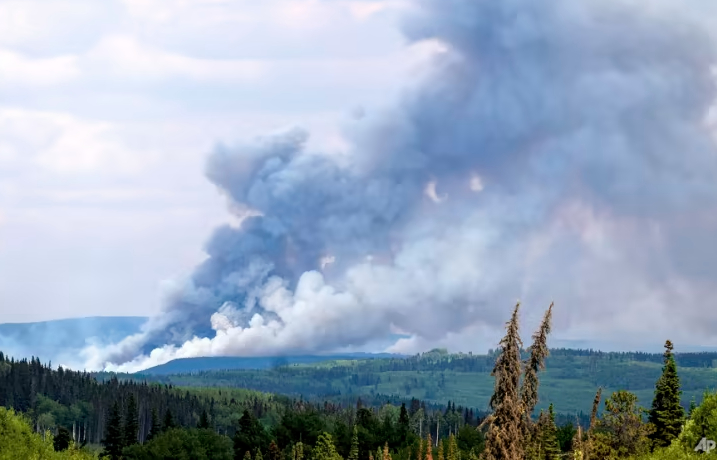November 28, 2025 | 02:30 GMT +7
November 28, 2025 | 02:30 GMT +7
Hotline: 0913.378.918
November 28, 2025 | 02:30 GMT +7
Hotline: 0913.378.918
But the heat is also just one way the planet is telling us something is gravely wrong, they said.

Several rounds of wildfire smoke originating from northern Canada brought dangerous air quality levels to eastern North America.
“Heat sets the pace of our climate in so many ways ... it’s never just the heat,” said Kim Cobb, a climate scientist at Brown University.
Dying coral reefs, more intense Nor’easters and the wildfire smoke that has choked much of North America this summer are among the many other signals of climate distress.
“The increasing heating of our planet caused by fossil fuel use is not unexpected, but it is dangerous for us humans and for the ecosystems we depend on. We need to stop it, fast,” said Stefan Rahmstorf of the Potsdam Institute for Climate Impact Research.
Some other recent “firsts” and events that indicate climate change has entered uncharted territory:
OCEAN WARMING
Most of the planet is covered by oceans, which have absorbed 90 per cent of the recent warming caused by planet-warming gases such as carbon dioxide and methane. In April, global ocean temperature soared to 21.1 degrees Celsius, which was attributed to the combination of greenhouse gas emissions and the early El Nino formation. Newly published data from the Copernicus Climate Change Service documented “exceptionally warm” ocean temperatures in the North Atlantic with “extreme” marine heat waves near Ireland, the UK, and in the Baltic Sea.
WILDFIRE SMOKE
Several rounds of wildfire smoke originating from northern Canada brought dangerous air quality levels to eastern North America. The high levels of wildfire smoke have become familiar on the West Coast, but scientists say that climate change will make wildfires and smoke more likely and intense and that the East Coast will see more of it.
EL NINO ARRIVES EARLY
The current El Nino - a period of warming Pacific Ocean waters - formed a month or two earlier than usual, replacing a La Nina that, with its cooling of Pacific waters, served as a damper on global temperatures. That means it will have more time than usual to strengthen. The World Meteorological Organization predicts there is a 98 per cent chance that at least one of the next five years will be the warmest on record, beating 2016 when an exceptionally strong El Nino was present.
SHRINKING ANTARCTIC SEA ICE
Scientists are watching Antarctic sea ice shrink to record lows. The 11.7 million square kilometres covered by the sheet on Jun 27 was almost 2.6 million square kilometres less than average for that date for the period from 1981-2010, according to the National Snow and Ice Data Center.
Put another way, an area nearly four times the size of Texas was gone from the ice sheet.
(AP)

(VAN) A new study reveals how the simultaneous effects of ocean acidification, salinity and loss of oxygen are making the world more fragile.

(VAN) Hopes are growing that the creation of the first 3D turkey gut model could be a turning point in the battle against the virulent blackhead disease.

(VAN) Tyson, America’s biggest meat supplier, plans to shutter one of its largest beef processing plants as the industry continues to struggle with low cattle supplies and political pressure from Washington.

(VAN) New FAO study shows how digital solutions are empowering farmers and fishers to prevent losses and build resilient agrifood systems.

(VAN) Brazil's COP30 presidency pushed through a compromise climate deal on Saturday that would boost finance for poor nations coping with global warming but that omitted any mention of the fossil fuels driving it.

(VAN) Poultry farmers in the UK have been warned that they could face one of the worst winters yet for bird flu.

(VAN) Prices of main-crop paddy have risen sharply, with jasmine rice hitting 16,100 baht per tonne — the highest level in years.